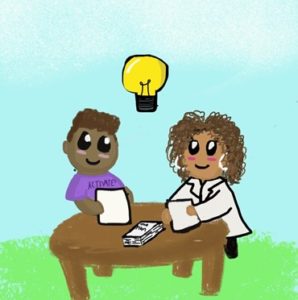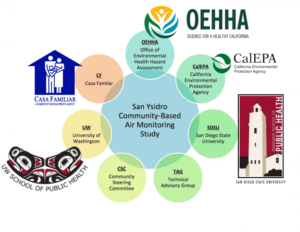By Estenia Ortiz Carabantes

Artwork by Estenia Ortiz Carabantes.
“Science includes justice, they are not mutually exclusive.” This was one of the many powerful takeaways I received from being a part of the Thriving Earth Exchange Science, Policy, and Engagement cohort (SPEC) trainings last September. This program stands for community science. Community science is when communities and scientists do science together to advance one or more community priorities (not needs). It takes an asset-based approach to community development where it uses the strengths, potential, resources, skills, and personal experiences of the community to take suitable action. This is in contrast to a needs-based approach also known a deficit model in which efforts are focused on the deficiencies and problems of a community. “Why is it that affluent neighborhoods have priorities and low-income areas have problems?”
The way the Thriving Earth Exchange program (https://thrivingearthexchange.org/) works is that community leaders submit their proposals for a project that would benefit the community as a whole and are then paired with a community science fellow. The community science fellow is then in charge of refining the project scope with the community, ensuring it is feasible within the time frame and representative of the community as a whole. After project scope refinement, the community science fellow scouts for potential volunteer scientists that can be a valuable asset to the team. From there, community leaders, fellows, and scientists work together to construct an actionable plan and get things done. And of course, sharing of this process and data collection can be done through various outlets such as social media, policy writing, journalism, op-eds, and educational campaigns.
I am working with the leading non-profit organization in San Ysidro, California called Casa Familiar (www.casafamiliar.org) which has 40+ years of history in advocacy, service provision, community planning and development. Its programs are as diverse as the residents they serve with programs ranging from civic engagement to health and social services to arts & culture to education. About 93% of the community is of Hispanic origin with 89% speaking Spanish at home as their primary language. Empowering residents in San Ysidro to be engaged in the sustainability, civic engagement, and quality of life of their region is a top priority for Casa Familiar.
One project recently done to shed light on air pollution issues in border communities like San Ysidro is the Community-Based Air Monitoring Study. Alongside San Diego State University, the San Diego Air Pollution Control District and the University of Washington, and other private and governmental partners (Fig. 1). Casa Familiar designed, deployed, and analyzed air quality data from low-cost air quality monitors around San Ysidro. The study found significant links between border wait times at the Port of Entry (POE) and air pollutant levels at nearby sites highlighting a strong need for air pollution mitigation strategies in the community. Now, Casa Familiar is advocating for innovative green solutions and carbon sequestration strategies for a proposed park in San Ysidro and is looking for potential scientists to bring on board. If you would like to learn more about the project, check out this link and feel free to contact me: https://thrivingearthexchange.org/project/san-ysidro-ca/
The motivation behind this work is to bring environmental justice to a community that has often been overlooked. Through the integration of meaningful community engagement with science, quality of life, sustainability, and equity can be achieved.

Fig. 1: San Ysidro Community-Based Air Monitoring Study – www.casafamiliar.org/san-ysidro-air-monitoring-study/
About the author Estenia Ortiz Carabantes is an Environmental Engineering PhD student at the University of South Florida. Her research interests include water quality, water reuse and management for functional value-added products, and sustainable development. She recently received her Master of Science in Environmental Engineering at the University of South Florida which analyzed heavy metal uptake by locally cultivated edible seaweed in Belize and potential health impacts. Her research also used a systems thinking approach to assess the food, energy, and water system nexus of seaweed farming and how it influences local livelihoods. Estenia received her Bachelor of Science in Environmental Engineering from the University of Florida where she conducted research investigating the removal of mercury from water using modified powdered activated carbon. Currently, Estenia is an Alfred P. Sloan Scholar, GAANN and STRONG Coasts Fellow, and has recently joined the AGU Thriving Earth Exchange program’s Science, Policy, and Engagement cohort as a Community Science Fellow.
STRONG COASTS is supported by a National Science Foundation Collaborative Research Traineeship (NRT) award (#1735320) led by the University of South Florida (USF) and the University of the Virgin Islands (UVI) to develop a community-engaged training and research program in systems thinking to better manage complex and interconnected food, energy, and water systems in coastal locations. The views expressed here do not reflect the views of the National Science Foundation.


Comments are closed.